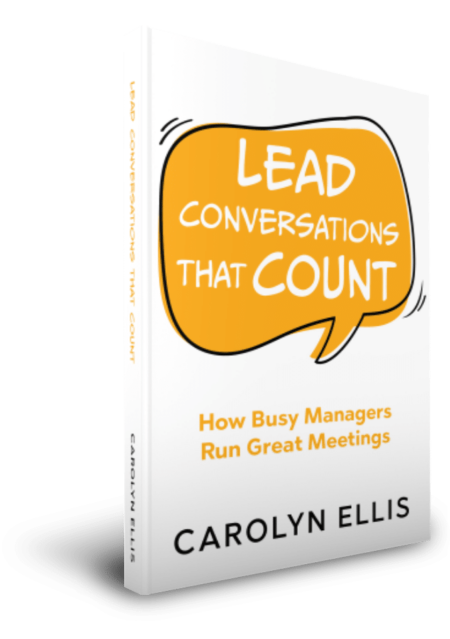Don’t have time to read? Click here to listen instead!

You Set the Bar
Excerpt from Lead Conversations that Count: How Busy Managers Run Great Meetings
(Rowntree Press, 2021)
Calibrating yourself before you start your meeting is the equivalent of stretching your muscles before you run a sprint. If you don’t do it, chances are you’ll walk into your conversation carrying a whole lot of baggage from previous experiences and perspectives. You’re starting the conversation weighed down with:
- Beliefs
- Biases
- Unprocessed issues from previous discussions
- Pressure and stress you feel to perform and deliver to people
- you report to, who are likely not even in the meeting
- Judgments about people you’ll be talking with
- Frustrations carried from unrelated incidents that impact your state and are easily picked up by others. It might be your feelings about the person who cut you off on the highway or
- someone who hasn’t yet responded to an email.
- Worries range from specific (Will my internet connection be reliable today when it wasn’t last week?) to global and existential (Will we ever get back to normal after this pandemic? or How will global warming impact my loved ones?).
Inner self-talk also impacts our ability to be present and resilient and show up confidently as our best in any situation. Recent research from Queen’s University in 2020 shows that the average person has 6,200 thoughts per day (Berman, 2020). A majority of those thoughts tend to be negative, as human brains have a “negativity bias”, which evolved as a survival mechanism that constantly scans our environment for threats (Hanson, et al., 2009).
If left unattended, negative self-talk can impact mental health, motivation and the ability to recognize and act on opportunities. Elizabeth Scott writes that this stress is primarily “due to the fact that their reality is altered to create an experience where they don’t have the ability to reach the goals they’ve set for themselves.” (Scott, 2020).
Phew! That’s a lot to have on your plate, and you haven’t even got to the meeting yet!
The problems organizations now face are challenging. When experiencing rapid change, low or declining engagement rates, and rising uncertainty, we all need our best thinking caps on. Collectively, humanity is facing some existential crises – environmental, political, socioeconomic – that will require innovation, agility and resilience to solve.
Old roles, strategies and reporting structures may be obsolete. This quote by Bill O’Brien sums up the importance of tackling your self-talk and calibrating yourself in this statement “The success of an intervention depends on the interior condition of the intervenor.”
How do we listen to one another? Do we learn from one another? Can we explore common ground to amplify strengths and build bridges where there may be gaps or differences of opinions?
The heart of solving any kind of challenge – whether it’s global warming, restructuring a business to thrive in a pandemic, or changing the on-boarding of new hires – lies in the quality of our relationships. When we, as leaders, do our own work well, we set the bar for our teams to do their best work.
Take Action
Dial up your awareness of your own self-talk and how it impacts you. Keeping a simply notebook on your desk and jotting down the kinds of messages, thoughts or doubts that cross your mind as they occur can be a powerful way to start to observe those patterns, without getting hijacked by them.
Stay curious and keep your sense of humour. If there is a persistent self-critical voice you notice, give it a name such as Cynical Sally or Judgemental Jack. When Sally or Jack show up in any circumstance, just acknowledge them with a simple “Oh hi, Sally – I’ll get back to you right after this meeting!” or “Hey Jack, are you still hung up on the fact your brother was valedictorian and you’re not. Ah well, them’s the breaks!” By creating a more objective perspective on these internal dynamics, you start to loosen their grip on your confidence and choices.
Resources
Debbie Ford, The Dark Side of the Light Chasers: Reclaiming Your Power, Creativity, Brilliance, and Dreams (Riverhead Books; 2010)
Carolyn Ellis, Lead Conversations that Count: How Busy Managers Run Great Meetings (Rowntree Press; 2021)
Author Information: This is an excerpt from Lead Conversations that Count: How Busy Managers Run Great Meetings by Carolyn Ellis (Rowntree Press, 2021). For more information on the book, please visit www.LeadConversationsThatCount.com. This article may be shared provided the author information is included.





